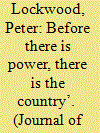|
|
|
Sort Order |
|
|
|
Items / Page
|
|
|
|
|
|
|
| Srl | Item |
| 1 |
ID:
170211


|
|
|
|
|
| Summary/Abstract |
This paper provides an ethnographic perspective on the street-level deliberations of Kenya's opposition supporters between the 2013 and 2017 elections, arguing that rather than appeals to ethnicity what defines its discourse are broader, inclusive notions of political membership. A civic nationalism is enunciated by opposition supporters that congeals support between multiple ethnic groups through its emphasis on universal values – democracy, due process, equality, adherence to the constitution. However, when such civic ideas are used in political campaigning and mobilising rhetoric, describing a resurgent Kenyan ‘people’ that has been systematically disenfranchised, they take on an exclusionary character. As ‘good constitutionalists’, opposition supporters contrast themselves with ‘bad nationalists’ associated with the government, portrayed as mobilising particularistic ethnic loyalties at the expense of a majority of Kenyans. In practice, their civic ideas remain only potentially inclusive.
|
|
|
|
|
|
|
|
|
|
|
|
|
|
|
|
| 2 |
ID:
191640


|
|
|
|
|
| Summary/Abstract |
Deputy President William Ruto’s victorious presidential campaign in Kenya’s 2022 elections saw him champion the plight of the ‘hustlers’, young informal economy workers on low, piecemeal incomes. Reconfiguring political identities around notions of economic hardship and struggle, Ruto’s campaign appeared emblematic of what scholars have recently identified as a turn towards ‘populism’ in Africa, transmuting ethno-nationalist identities into class-based ones. However, whilst Ruto’s campaign capitalized on rising prices to devastating political effect, he also channelled discontent with the Jubilee government and its unmet promises of shared prosperity. Drawing on ethnographic data collected in central Kenya’s Kiambu region since 2017, this article understands Ruto’s victory not through the lens of ‘hustler populism’ but rather as an anti-Jubilee ‘backlash’. Ruto’s campaign took advantage of Uhuru Kenyatta’s personal unpopularity as voters increasingly questioned the nature of ‘dynastic’ authority and ‘state capture’, seeking to punish Uhuru personally for his failures to create prosperity in the region whilst enriching himself at their expense. Elaborating on these tensions, the article points towards broken ‘moral economies’ between voters and politicians as a vital field of research.
|
|
|
|
|
|
|
|
|
|
|
|
|
|
|
|
|
|
|
|
|